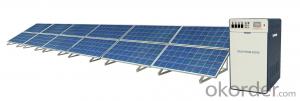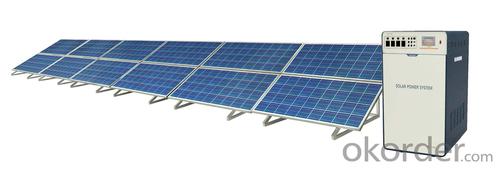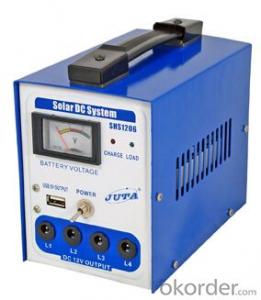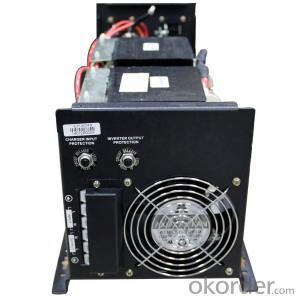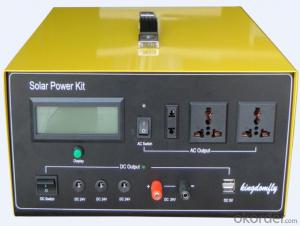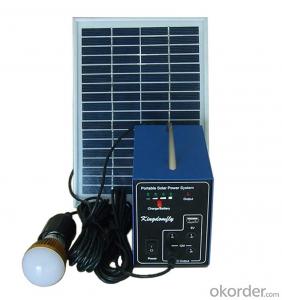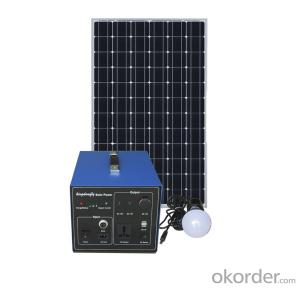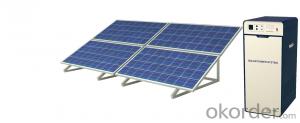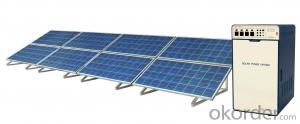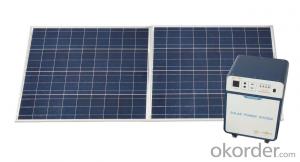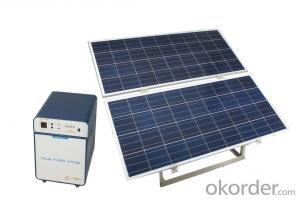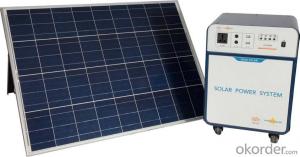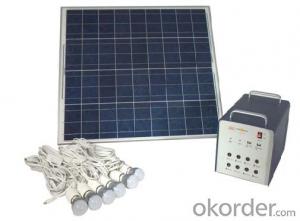Solar Energy Systems South Bend - Off-Grid Solar Power System JS-SPS-3000
- Loading Port:
- Tianjin
- Payment Terms:
- TT OR LC
- Min Order Qty:
- 10 set
- Supply Capability:
- 10000 set/month
OKorder Service Pledge
Quality Product, Order Online Tracking, Timely Delivery
OKorder Financial Service
Credit Rating, Credit Services, Credit Purchasing
You Might Also Like
General Introduction
Solar power system provides alternating current and direct current, which is produced by the modules transforming solar power into power, to home lighting, household appliance and other DC appliance, such as cell phone and laptop.
Solar power system is widely used in area lack of power, for example house power supplying, monitoring, communication base, fire prevention in forest area, pasture and meadow, aquaculture etc.
We are dedicated to provide high quality off-grid PV products and systems to customers and has received a series of certificate, including ISO9001, TUV, UL, CE, CQC and RoHS.
Off-grid Solar Power System
High efficent PV module can produce more power.
Sine wave output is suitable for all kinds of load. Varieties of DC output, let it more
convenient for users.
The multifunction design make it easy to operation and maintenance.
Solar power system provides alternating current and direct current, which is produced by the modules transforming solar power into power, to home lighting, household appliance and other DC appliance, such as cell phone and laptop.
Solar power system is widely used in area lack of power, for example house power supplying, monitoring, communication base, fire prevention in forest area, pasture and meadow, aquaculture etc.
We are dedicated to provide high quality off-grid PV products and systems to customers and has received a series of certificate, including ISO9001, TUV, UL, CE, CQC and RoHS.
Off-grid Solar Power System
High efficent PV module can produce more power.
Sine wave output is suitable for all kinds of load. Varieties of DC output, let it more
convenient for users.
The multifunction design make it easy to operation and maintenance.
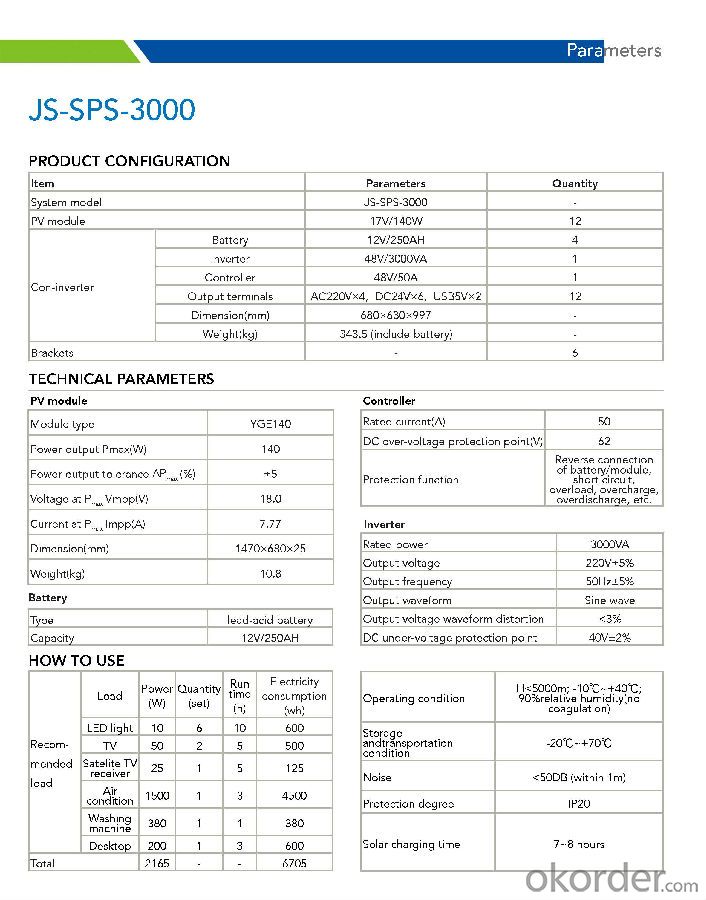
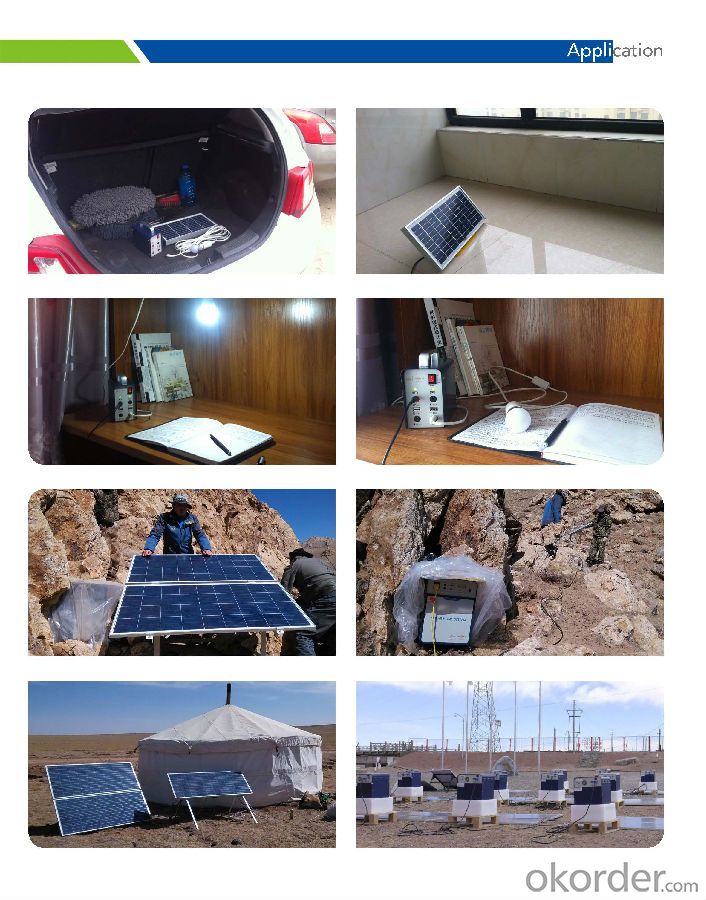

- Q: Can solar energy systems be used in areas with high levels of seismic activity?
- Yes, solar energy systems can be used in areas with high levels of seismic activity. However, it is important to design and install these systems with proper engineering considerations and precautions to withstand potential earthquakes. By implementing robust mounting structures, flexible connections, and secure anchoring systems, solar panels can be made resilient to seismic forces. Additionally, regular inspections and maintenance should be carried out to ensure the integrity and safety of the solar energy systems in earthquake-prone areas.
- Q: What is the average payback period for a solar energy system?
- The average payback period for a solar energy system varies depending on various factors such as the initial cost of the system, location, energy usage, available incentives, and financing options. However, on average, it typically ranges from 5 to 10 years.
- Q: How do solar energy systems impact the value of a property?
- Solar energy systems can have a positive impact on the value of a property. By reducing or eliminating electricity bills, increasing energy efficiency, and providing a clean and sustainable source of power, solar energy systems are seen as valuable additions to a property. Additionally, properties with solar panels often attract environmentally conscious buyers who are willing to pay a premium for homes with renewable energy systems, thus increasing the overall value of the property.
- Q: Can solar energy systems be used in areas with limited space on rooftops due to existing equipment or structures?
- Yes, solar energy systems can be used in areas with limited space on rooftops due to existing equipment or structures. There are various types of solar energy systems available, such as solar panels that can be mounted on the ground or integrated into walls or facades. Additionally, innovative technologies like solar shingles or thin-film solar cells can be used in areas where traditional solar panels may not fit. Therefore, even with limited rooftop space, it is still possible to harness solar energy and benefit from its renewable and sustainable advantages.
- Q: Can solar energy systems generate power at night?
- No, solar energy systems cannot generate power at night because they rely on sunlight to generate electricity.
- Q: Can solar energy systems be used in cold storage facilities?
- Yes, solar energy systems can be used in cold storage facilities. Solar panels can generate electricity to power refrigeration systems and other equipment in cold storage facilities. Additionally, solar thermal systems can provide heat for defrosting purposes or to maintain optimal temperatures inside the facility. Implementing solar energy systems in cold storage facilities can help reduce operating costs and carbon emissions.
- Q: Can solar energy systems be used during power outages?
- Yes, solar energy systems can be used during power outages. They can provide a reliable source of electricity as long as they are equipped with a battery storage system to store excess energy generated during the day. This stored energy can then be used to power essential appliances and devices during power outages, ensuring continuous electricity supply.
- Q: Can solar energy systems be used in areas with limited access to technical expertise?
- Yes, solar energy systems can be used in areas with limited access to technical expertise. Solar energy systems are increasingly designed to be user-friendly and require minimal technical expertise for installation and maintenance. Additionally, training programs and educational resources are available to help individuals in these areas learn how to install and maintain solar energy systems effectively.
- Q: How much do solar energy systems cost?
- The cost of solar energy systems can vary significantly depending on various factors such as the size of the system, location, quality of equipment, and installation costs. On average, residential solar energy systems can range from $10,000 to $30,000, but it's important to get a personalized quote from a reputable solar provider to get an accurate cost estimate for your specific needs.
- Q: How do solar energy systems impact global warming?
- Solar energy systems have a positive impact on global warming as they provide a clean and renewable source of energy. By harnessing the power of the sun, solar systems reduce the dependence on fossil fuels, which are major contributors to greenhouse gas emissions. The use of solar energy helps to mitigate climate change by reducing carbon dioxide emissions and other pollutants, ultimately helping to slow down the progression of global warming.
Send your message to us
Solar Energy Systems South Bend - Off-Grid Solar Power System JS-SPS-3000
- Loading Port:
- Tianjin
- Payment Terms:
- TT OR LC
- Min Order Qty:
- 10 set
- Supply Capability:
- 10000 set/month
OKorder Service Pledge
Quality Product, Order Online Tracking, Timely Delivery
OKorder Financial Service
Credit Rating, Credit Services, Credit Purchasing
Similar products
Hot products
Hot Searches
Related keywords
